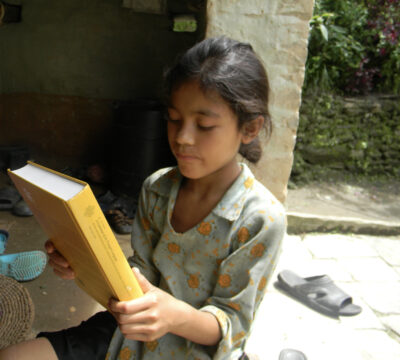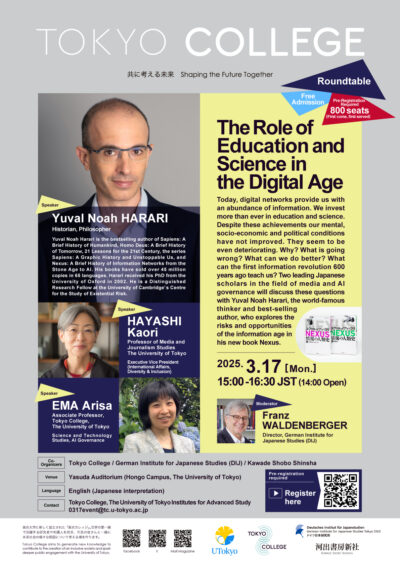China: Autocracy 2.0 (Lecture by Prof. David YANG)
イベント予定Wednesday, 4th June, 15:00-16:30 JST
Modern China exemplifies Autocracy 2.0: economically strong, tech-savvy, and globally connected, using sophisticated control methods. What defines China’s political economy, and what drives Autocracy 2.0? What is its future direction? I examine autocracies’ two key challenges: incentives and information. While Autocracy 1.0 relied on fear and coercion, Autocracy 2.0 uses economic incentives to align interests with regime survival, fostering support. It employs advanced bureaucratic structures and technology to manage incentives and information, enabling success in a high-information environment. Finally, I explore Autocracy 3.0’s potential. In China, forces might revert to Autocracy 1.0, using technology for state control as growth slows but aspirations stay high. Globally, modern autocracies, led by China, are becoming major geopolitical forces, challenging the liberal democratic order.
Discourses about Environment and Nature in the Hebrew Bible (Lecture by Prof. Thomas RÖMER)
イベント予定講演会/LectureThursday, 22 May, 13:00–14:30 JST
This lecture will argue that the Hebrew Bible contains different views on nature and the environment, especially in relation to the destruction of the kingdom of Judah and its capital Jerusalem in 587 BCE. This event triggered different discourses of crisis management that will be analyzed with the help of a German sociologist Armin Steil who distinguishes three attitudes toward crisis also found in the Hebrew Bible: 1) The prophetic attitude: belief that crisis will lead to a new creation with harmony between humans, nature, and animals; 2) The mandarin attitude: view of disasters as divine punishment without much interest in the environment; and 3) The priestly attitude: construction of a mythic past that offers rituals for the present with interest in the place of humans in their environment. The last discourse offers an important reflection about a possible harmony between all beings.
Dealing with the Brussels Effect: How should Japanese companies prepare for the EU-AI Act? 4
イベント予定パネルディスカッション/Panel discussion講演会/LectureMonday, 12 May 2025, 17:30-18:30 JST
This webinar will explain the consultation's key points and provide insights to help participants understand how to engage effectively. It’s a unique opportunity to influence the guidelines that will directly impact the implementation of the EU AI Act.
Beyond World Literature (Lecture by Prof. Wiliam MARX)
イベント予定講演会/LectureThursday, 8 May, 10:30–12:00 JST
World literature has been a reality since at least the nineteenth century. Texts travel across continents and cultures, translated from every language, taught in universities worldwide, and forming an emerging global canon. Never before have we been so free to read whatever we wish, from anywhere. Or so it seems. But is this true freedom, or merely a comforting illusion? What are the boundaries of this seemingly limitless literary exchange? This talk aims to explore those limits and propose a new approach to literature—a different way of reading texts, one that is either entirely new or, perhaps, simply old and forgotten. Welcome to the world library!
Equal Rights, Unequal Reality: Law and Gender Equality in Japan (Lecture by Prof. Frank UPHAM)
イベント予定講演会/LectureWednesday, May 7, 2025 10:30-12:00 JST
Japan outlaws gender discrimination in virtually the same terms as every equivalent country and yet it ranks 118th out of 146 countries, 111 notches below Germany, 103 below the US. Why? Is it that Japanese culture demands women remain meekly at home? If so, why do women graduate from universities at a higher rate than men? Why do they participate in the work force at a high rate? Why do they bring – and win - employment discrimination suits? This lecture will explore these questions and offer tentative – extremely tentative – observations on the reasons.
Designing and Scaling up Nature-based Markets (Lecture by Prof. Beatrice WEDER DI MAURO)
イベント予定講演会/LectureWednesday, April 23, 2025 15:00-16:30 JST
Carbon and nature markets are struggling with low trust, high costs, and limited scale—falling far short of what’s needed. In this lecture, Professor Weder di Mauro presents a new market design co-developed with Estelle Cantillon and Eric F. Lambin. Jurisdictions offer large-scale projects; investors buy shares that yield carbon and biodiversity “dividends” without conferring land ownership. Market prices reveal demand and support liquidity. Compared to credit-based systems, this approach cuts costs, boosts credibility, and supports long-term commitments. It tackles the core problems holding back today’s markets—and offers a credible path to scale with real environmental impact.
The Meaning and Implications of Being a “Visitor-Centered” Museum (Lecture by Prof. Leslie BEDFORD)
イベント予定講演会/LectureTuesday, 22 April, 14:30–16:00 JST
From "Being about Something to Being for Somebody" is the memorable title of Stephen Weil's contribution to the 1999 Daedalus volume on American Museums. Though decades old and not without challenges, the phrase continues to resonate within the museum field. In many ways it encapsulates the ways in which institutions have changed from privileging curator-defined information and institution-defined goals to promoting the visitor's experience and the broader community.
In her talk, Leslie Bedford, a longtime museum practitioner and professor of museum studies, will explore the meaning of Weil's phrase and how it has been implemented by museums, including those she has visited in Japan. Her talk will include a discussion of the online conversations she is facilitating with Japanese museum professionals and academics. And finally, she will raise the question of what "visitor centered" can mean today and in the future.
The worlds of the Black Death: new approaches (Lecture by Prof. Patrick BOUCHERON)
イベント予定講演会/LectureWednesday, 16 April, 10:00–11:30 JST
The “Black Death” refers to the peak of the second plague pandemic, which spread across Europe from 1347. It remains the greatest demographic catastrophe in history. Today, interdisciplinary research—combining funerary archaeology, anthropology, microbiology, and environmental sciences—has transformed our approaches to it. Advances from DNA analysis to climate studies have contributed to a new understanding. Yet, the challenge remains: how to write a global history of a long-term event on a global scale? Though its precise geography is unclear, the plague’s routes trace the lines of force of connected worlds, mapping out a space that is discontinuous and global, like an archipelago.
What is the Purpose of Machines that Serve no Purpose? (Lecture by Prof. Dominique LESTEL)
イベント予定講演会/LectureWednesday, 9 April, 2025 JST 15:00-16:30 JST
Despite the enthusiasm they generate, it is difficult to satisfactorily identify what humanoid robots could do that a human or a non-humanoid robot could not do better and more cheaply, and this observation constitutes a major challenge for the philosopher. Using the example of Sophia, the first humanoid robot to be granted citizenship in 2017, I will suggest that these strange machines occupy a sensitive place in our societies by taking on the role of messianic machines (machines that announce the coming of other machines), metaphysical machines (machines that force us to ask fundamental metaphysical questions such as knowing who is human or who is alive) and conjuring machines (machines that help to fight against the fear of dangerous machines).
Collaborations in Language: from Documentation to Resurgence (Lecture by Prof. Mark TURIN)
イベント予定講演会/LectureFriday, 4 April, 13:00–14:30 JST
In this richly-illustrated lecture, I discuss two collaborative partnerships in which I have been involved with historically marginalized, Indigenous communities in both the Himalayan region and in Native North America who are working to preserve and revitalize their languages. Through the presentation, I explore these three words: Collect, Protect, Connect.
Dealing with the Brussels Effect: How should Japanese companies prepare for the EU-AI Act? 3
イベント予定パネルディスカッション/Panel discussion講演会/LectureWednesday, 19 March 2025, 12:00-13:00 JST
At the University of Tokyo, a webinar was held on December 11, 2024 and January 15, 2025, to explain the EU AI Act and the first draft of the CoP. In this webinar, we will provide an overview of the third draft released at the end of February and highlight important points that Japanese companies should particularly pay attention to.
The Role of Education and Science in the Digital Age (Yuval Noah HARARI)
イベント予定パネルディスカッション/Panel discussion共催/Joint EventMonday, 17 March 2025, 3:00 - 4:30 pm (Doors open: 2:00 pm)
Today, digital networks provide us with an abundance of information. We invest more than ever in education and science. Despite these achievements our mental, socio-economic and political conditions have not improved. They seem to be even deteriorating. Why? What is going wrong? What can we do better? What can the first information revolution 600 years ago teach us? Two leading Japanese scholars in the field of media and AI governance will discuss these questions with Yuval Harari, the world-famous thinker and best-selling author, who explores the risks and opportunities of the information age in his new book Nexus.
GPAI Future of Work: Survey Report 2024 in Japan
イベント予定パネルディスカッション/Panel discussionThursday, 13 March, 2025, 16:00-18:00
The Global Partnership on AI (GPAI), established in June 2020, is an international initiative for the responsible development and use of AI based on the concept of “human-centered.” The GPAI has several working groups, one of which discusses the “Future of Work.” As part of this group’s project, an international interview survey is being conducted around the world to find out how our work will change as AI is introduced into the workplace. One of the unique methods of this survey is that the students who will be responsible for the future are interviewing companies and organizations.
At this event, following the survey report last year, we will introduce an overview of the survey conducted this year. Inviting students and faculty members who joined in this year’s project to share their observations on the “future of work” through the survey, we also discuss the possibilities and challenges of its methodological aspects. We would like to discuss future developments of the survey with companies, organizations, and students who are interested in this work.
Japanese as a Global Brand: Writing Japanese the European Way (Lecture by Prof. Viktoria ESCHBACH-SZABO)
イベント予定講演会/LectureTuesday, 4 March 2024, 15:00-16:30 JST
This lecture explores the influence of the Japanese language on the global branding of Japan beyond its borders. It examines how the Japanese language is strategically employed to evoke distinct imagery, cultural significance, and authenticity. The session offers insights into the current landscape and future research directions of Japanese language as an important world language. Employing linguistic case studies from Germany and Hungary, the lecture highlights how Japanese writing elements are rephrased or combined with a product’s identity and with design cues evoking Japaneseness. Creatively adapted in new contexts overseas, the Japanese language has become a strong branding tool in Europe.
Rethinking the Japanese Past: Revising a Textbook, Revising History (Lecture by Prof. Andrew GORDON)
Thursday, 27 February 2025, 15:00-16:30 JST
The past, it is said, is a foreign country, and historians seek to understand it without imposing present-day values. Yet inevitably, to write history is to engage in a dialogue between the past and the present. In this talk I will introduce my internal dialogue over the 25 years during which I wrote four editions of A Modern History of Japan, and am now considering a fifth edition.
Panel Discussion: “US-Japan Political Relations under the New Leaders”
イベント予定パネルディスカッション/Panel discussionFriday, 21 February 2025 9:00 - 10:15 JST/ Thursday February 20, 19:00 - 20:15 EST
Will President Trump demand higher defense spending by Japan? How will Japan respond? President Trump has pledged to negotiate a deal to end the Russia-Ukraine War in the first 100 days of his administration. Will it happen? How will he do that? What will the truce influence the situations in East Asia? Will Japan’s policy to advance defense technologies and promote defense industry succeed? Will Ishiba’s minority government be able to handle it?
British perceptions of China and policy towards Japan, 2010-2024 (Lecture by Ushioda Fellow Alastair MORGAN)
イベント予定講演会/LectureTuesday, 18 February 2025, 15:00-16:30 JST
The Conservative-led British government's perception of China changed markedly between 2010 and 2024. In 2010, Prime Minister David Cameron described the rise of China as an opportunity. A decade on, the government described China as the biggest long-term threat to the UK's economic security and expressed increasing concerns about Chinese assertiveness overseas. During the same period, the UK and Japan built up an ever-closer security relationship. Did British government perceptions of China determine its policy towards Japan during this period, or were other factors just as influential? What approaches should we expect now from the new Labour government?
Panel Discussion: “US-Japan Economic Relations under the New Leaders”
イベント予定パネルディスカッション/Panel discussionFriday, 14 February 2025 9:00 - 10:15 JST/ Thursday February 13, 19:00 - 20:15 EST
President-elect Donald Trump threatened to impose 60% tariffs on imports from China, 25% on imports from Canada and Mexico, and 10% on imports from the rest of the world. Three weeks after the inauguration, what are the prospects for those tariffs? If those are really implemented, what will Japan do? Will Japanese manufacturers just suffer huge declines in exports to the United States? Will Japanese manufacturers increase tariff-jumping investment in the U.S.? Will it turn out that they have already shifted enough production to the U.S. to avoid the negative impacts of tariffs entirely? If China and the EU retaliate the U.S. with their tariffs, a tariff war is likely to harm the global trades and cross-border investment. How will Japanese manufacturers respond?
Everyday Ambassadors: Turning Chaos Into Connection in a Divided World (Lecture by Prof. Annelise RILES)
イベント予定講演会/LectureThursday, 13 February 2025, 10:00-11:30 JST
In her new book Everyday Ambassadors, Annelise Riles argues that we are on the cusp of an exciting new world order, where leadership is not just in the hands of few but of all. She argues that what the world needs now is many more diplomats--connectors, translators, interpretors, across political and cultural differences, between science and religion, between the arts and the technology world. In this talk, Prof. Riles will discuss her book, which synthesizes decades of legal and ethnographic research into seven "moves" that empower anyone to be a great diplomat right from where you are.
Immortal intelligence and rise of the DNA-independent humanity (Lecture by Prof. Johan BJÖRKEGREN)
イベント予定講演会/LectureWednesday, 29 January 2025, 15:00-16:30 JST
Around 60,000 years ago, at the time when humans successfully migrated out of Africa, something transformational happened. Homo sapiens must have experienced significant DNA changes that profoundly altered our capacity to compete for natural resources. Critical for this change in our behaviors was a new capacity for abstract thinking. Today with AI, we are on the brink of taking the final step away from Darwin’s principle of Survival of the fittest by rapidly evolving to escape our DNA dependence altogether and thereby our mortality as well.
Why Does Sexual Violence Continue to Occur? An Examination of the Underlying Social Norms (Lecture by Prof. OSAWA Machiko)
イベント予定共催/Joint Event講演会/LectureTuesday, 21 January 2025, 14:00-15:30 JST
As survivors raise their voices, the realities of sexual violence are gradually coming to light. Despite this increased attention, why does sexual violence continue to occur? This lecture examines the experiences of sexual violence survivors based on data collected from 38,383 responses to a 2022 NHK survey on the prevalence of sexual violence. It highlights the existence of rape myths in Japanese society, which perpetuate a pattern in which victims are blamed and suffer even further. Underlying these issues are societal norms of masculinity that sustain gender inequality. To eliminate sexual violence, it is essential to critically reexamine these societal norms.
Dealing with the Brussels Effect: How should Japanese companies prepare for the EU-AI Act? 2
イベント予定講演会/LectureWednesday, 15 January 2025, 16:00-17:00 JST
At the University of Tokyo, a webinar was held on December 11, 2024, to explain the EU AI Act and the first draft of the CoP. In this webinar, we will provide an overview of the second draft released at the end of December and highlight important points that Japanese companies should particularly pay attention to.
Tokyo College 5th Anniversary Event “Shaping a Future of the Planet and Humanity Together”
イベント予定シンポジウム/SymposiumWednesday, 18 December 2024, 14:00-17:30 JST
The Salon ー Conversations with Prominent Professors at the University of Tokyo (Season 3)
イベント予定対話/DialogueEvery Monday from December 2, 2024 (Available from 17:00 JST)
“The Salon” is a dialogue series featuring distinguished scholars in the humanities at the University of Tokyo that aims to transcend disciplinary boundaries. It is hosted by Professor Naoko Shimazu of Tokyo College and Professor John Lie of UC Berkeley, who is currently staying at Tokyo College.
We invite you to listen to an informal discussion between experts in different fields, as if you are sitting next to them.This is a chance to see a new side of our guests that you have never seen before.




























